We’ve found lots of scams this week, including ones relating to Lowe’s, Apple, UPS, Netflix, and Delta Air Lines. Would you have been able to spot all these scams?
Online Shopping Scams
As Father’s Day approaches, many brands are promoting sales campaigns with tempting discounts. However, scammers are seizing the chance to exploit people by posing as these brands and creating fake shopping sites.
Lowe’s Factory Shop Scam — Fake Lowe’s Website
Since May 15, we’ve already detected more than 247,640 fake websites with Father’s Day-related sales/promotional campaigns globally, and there are more emerging every day. For example, last week a fake Lowe’s website called lowes-factory[.]shop got a lot of traffic:
![Fake Lowe’s Website — lowes-factory[.]shop](https://news.trendmicro.com/api/wp-content/uploads/2023/06/Spot-the-Scam_Fake-Online-Shop_20230609-1024x768.jpg)
On Scamadviser, the trust score of this website is only 1 out of 100. Plus, the website is very young — registered on June 3, 2023.
![lowes-factory[.]shop: registered on 06/03/23 (Whois)](https://news.trendmicro.com/api/wp-content/uploads/2023/06/MicrosoftTeams-image-166.png)
Fake Lowe’s Texts
Besides lowes-factory[.]shop, there are other fake Lowe’s websites out there being spread via text messages. Watch out! (Note: the legitimate Lowe’s web address is lowes.com)
- ENJOY Lowe’s appliances with 00% OFF this month <URL>
- Congrats Pick LOWES Product <URL>
- Celebrate MemDay Lowes <URL>
- Claim LOWES Product Today <URL>
Shop Safely with ScamCheck
Always double-check reviews of shopping websites before you place any orders. The top safety tip to avoid phishing scams is to NEVER click on any unknown links. Or, you can use our 100% FREE tool, Trend Micro ScamCheck, to detect scams with ease!
Trend Micro ScamCheck is a free browser extension and mobile app for detecting scams, phishing attacks, malware, and dangerous links. Download today and surf the web with confidence!
The ScamCheck browser extension blocks dangerous sites in real time!
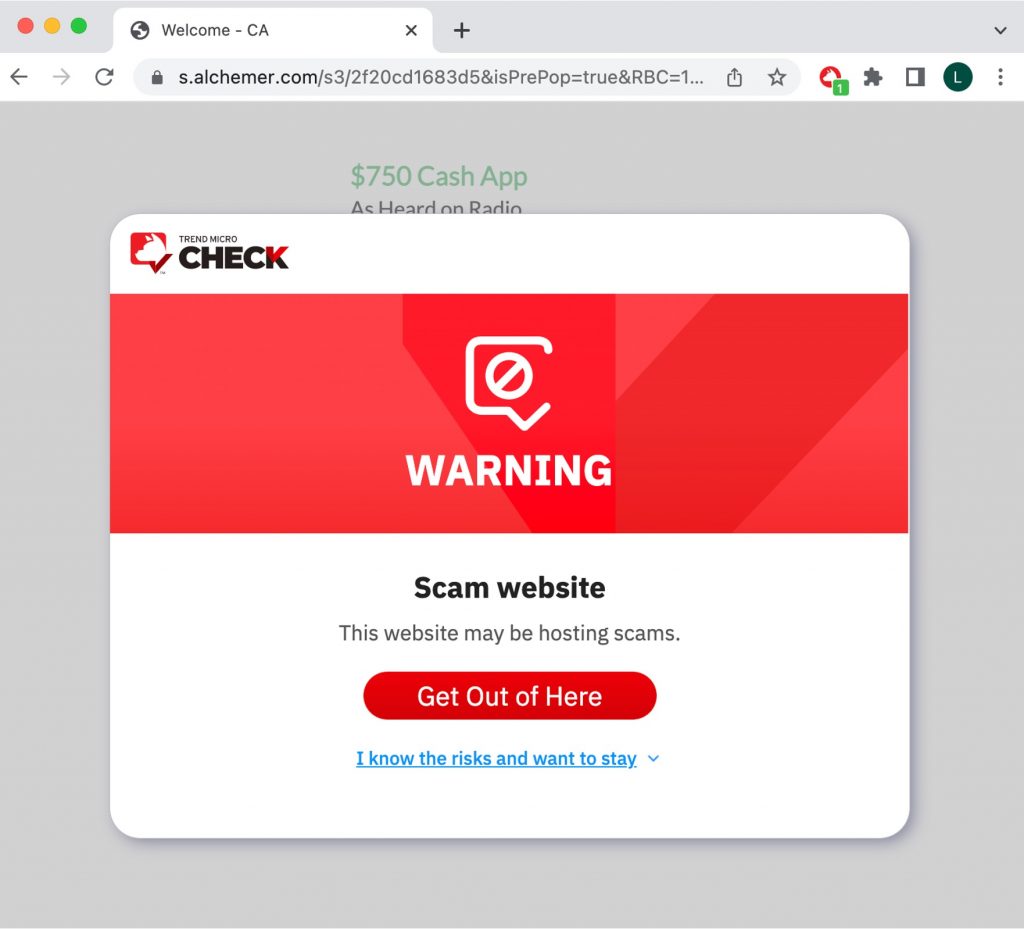
The ScamCheck app automatically detects and filters scams and spam 24/7.
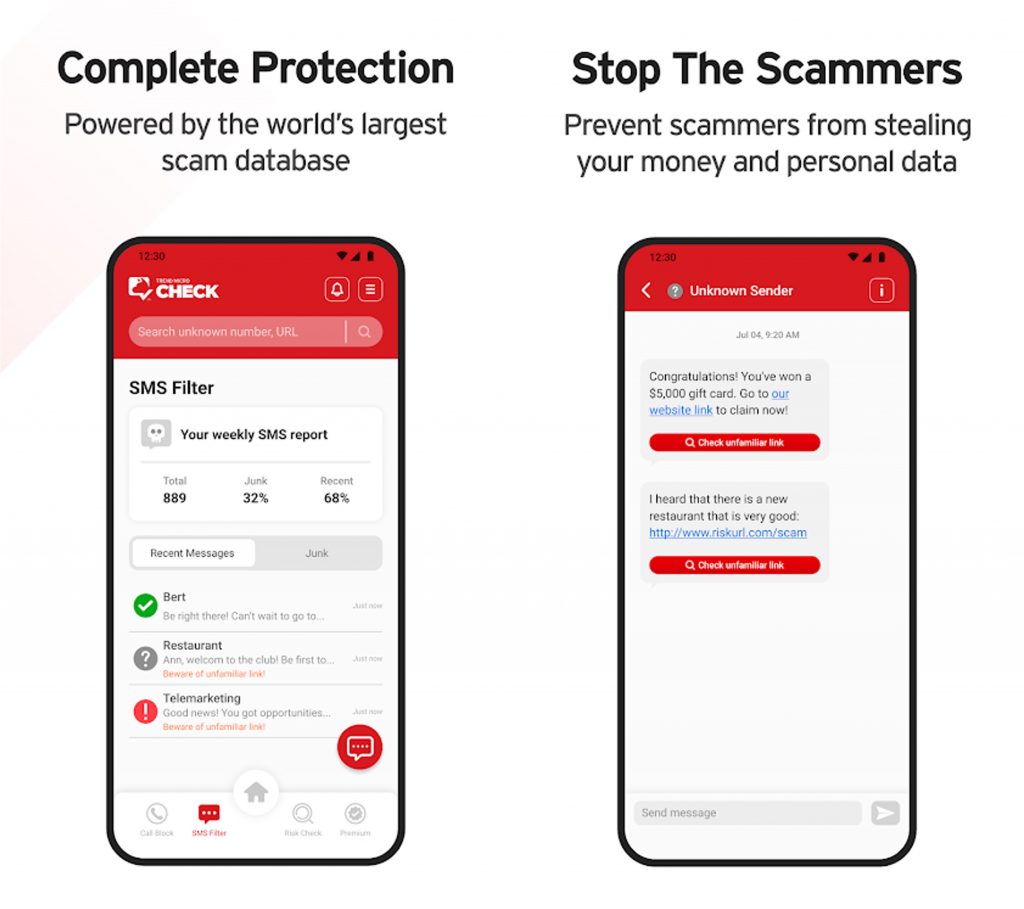
Phishing Scams: You Could Be the Fish in Scammers’ Net
On top of shopping scam sites, scammers also come with phishing scams. Impersonating trusted brands, and under a variety of pretenses, scammers love to spread phishing links via text message or email — always with the goal of stealing your personally identifiable information (PII) (i.e. email address, Social Security number, credit card number, and more).
The phishing links lead to phishing sites designed to record your PII, with which scammers can commit other crimes, such as identity theft.
Most commonly, the phishing links will take you to fake login pages where scammers can record your login credentials and other data.
#1 – Fake Apple Account Security Alert
Posing as Apple and falsely claiming that you need to update your account for some (non-existent) security issue, scammers send you a fake Apple notification containing a phishing link:
Your Apple account has been suspended, please update your payment details by visiting <URL>
The link leads to a fake Apple Pay verification page that asks you to enter lots of personal data, including your name, mobile number, address, and credit card information. Once submitted, this info will end up in the scammers’ hands and enable them to take control of your account.
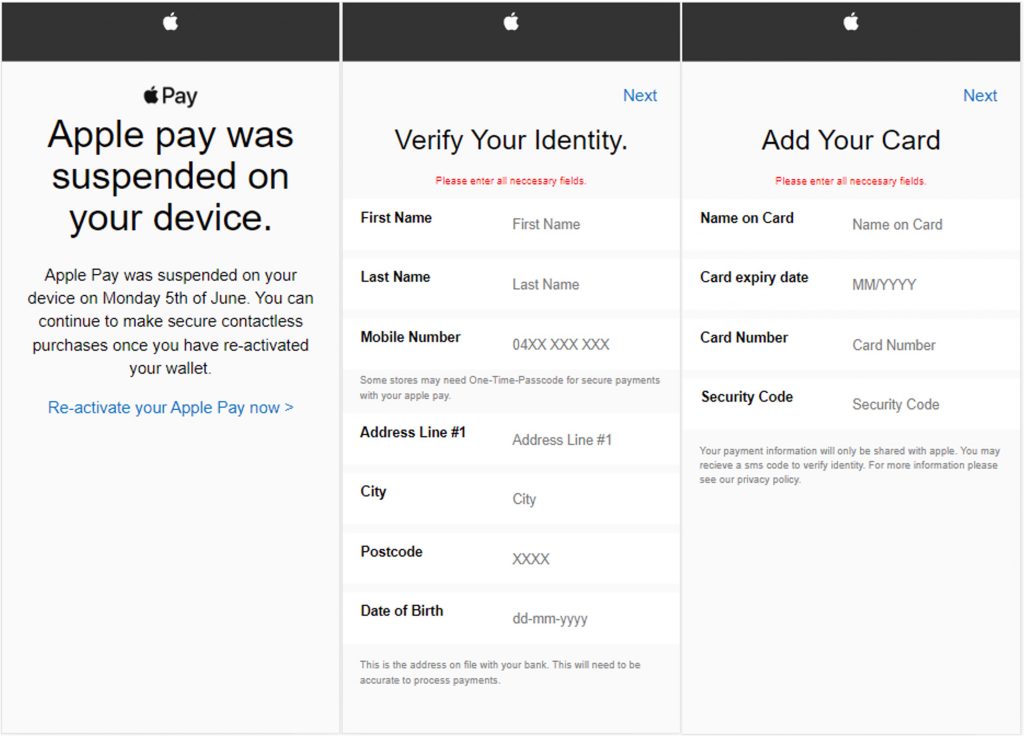
#2 – Fake UPS Delivery Notification
Scammers also love to impersonate delivery companies like UPS and send out fake shipping notifications to try to trick you into sharing your sensitive data:
Tracking: #UPS-ZHUWXCCTLC. <URL> IDHZIJWA
The attached link will take you to a fake UPS package tracking page with a random delivery number shown. If you proceed on the page, you could eventually expose your PII. Be careful!
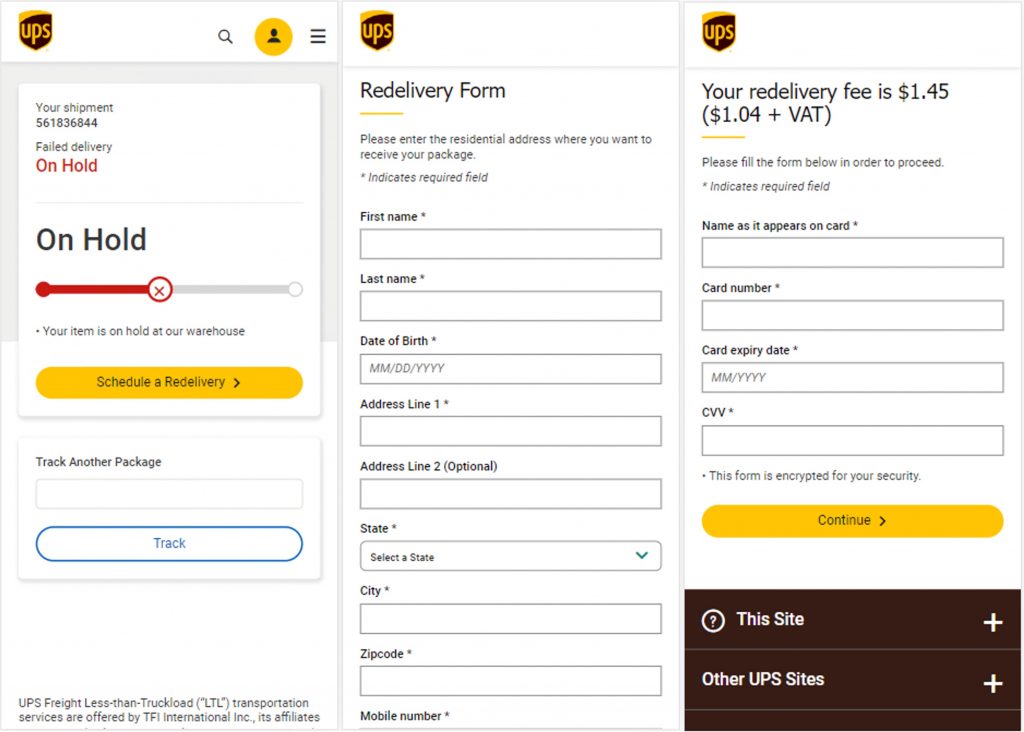
Netflix Phishing Email
Fake Netflix emails are not new to us, and this week scammers have been using bogus payment issues as a ploy to trick you:
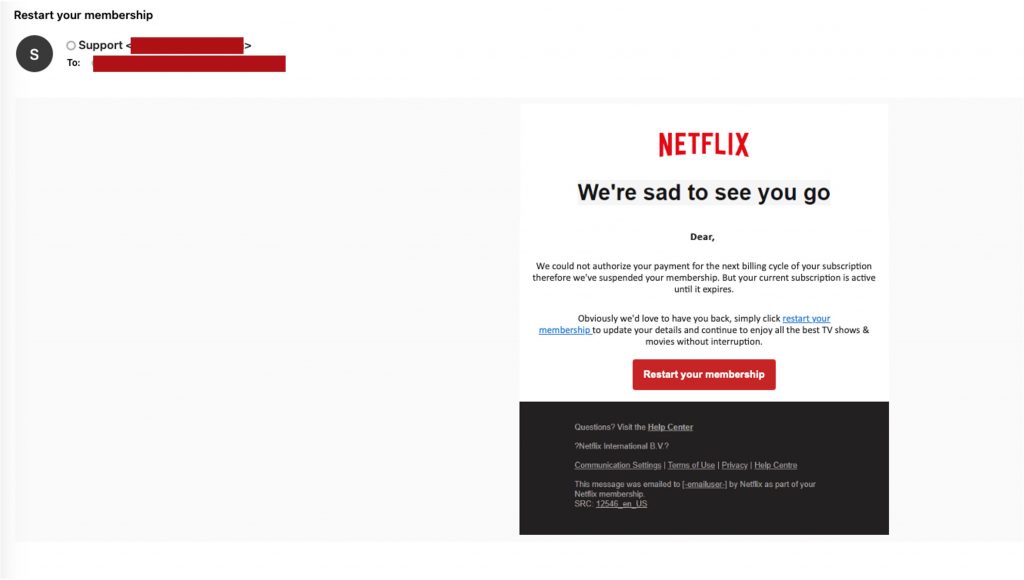
The email prompts you to click on the embedded button to “Restart your membership.” The button will take you to a fake Netflix login page. If you’ve read this far, you already know what could happen: scammers could steal your login credentials, gain access to your Netflix account, and hijack it!
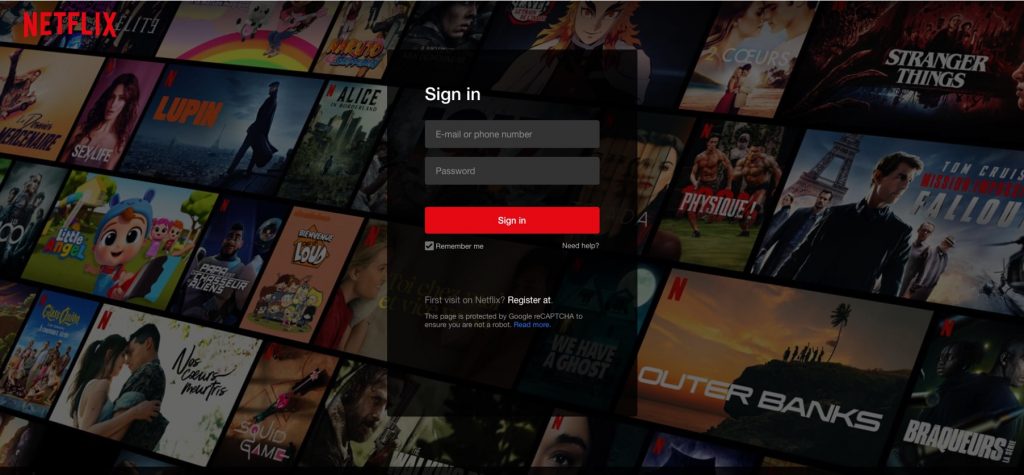
Delta Air Lines Phishing Email
We’ve reported on Delta Air Lines scams before, but now that we’re heading into the travel season, there’s a new wave of such scams again. Below is an example of a fake Delta Air Lines email that states you can win a $100 gift card by filling out an online survey: (Note: take a close look at the sender’s email address and you will realize it’s fake!)
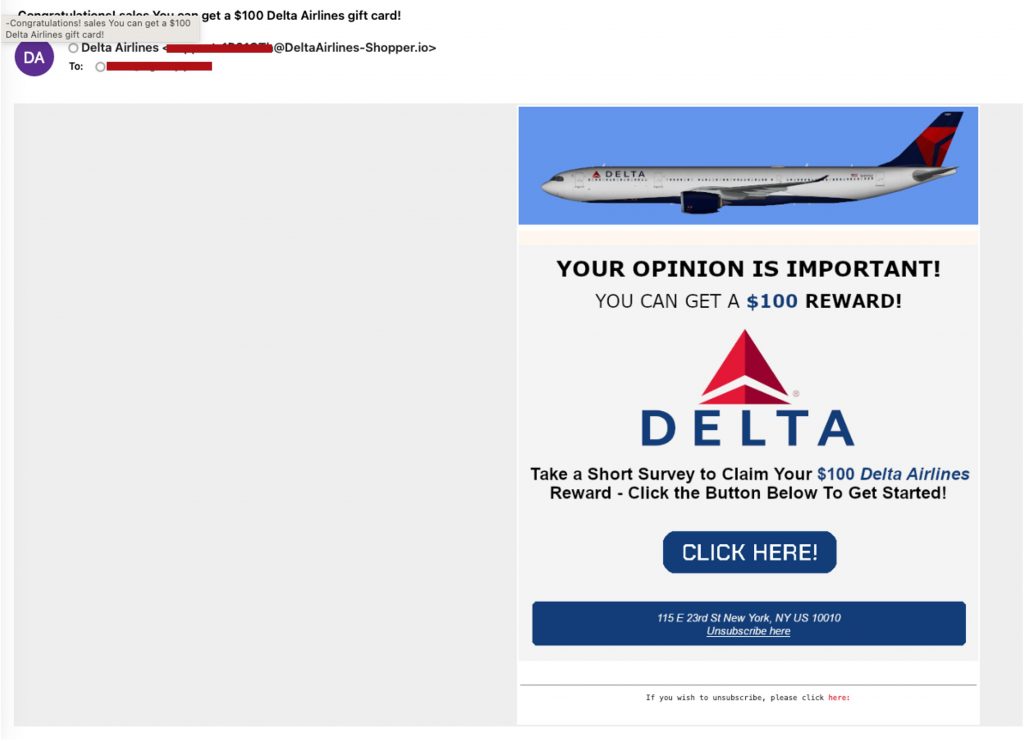
If you were to take the bait, you will be taken to a phishing page impersonating Delta Air Lines. Again, as we’ve stressed multiple times before, any data you enter on pages such as this will be shared with the scammers, who will use it for their own good. Beware!

Tips to Avoid Scams and Phishing Attempts
- Shop on well-known, legitimate websites.
- Double-check the sender’s mobile number/email address. Even if it seems legitimate, think twice before you take any action.
- Free gifts are a red flag.
- Only use official websites/applications. Never click on dubious links! (Use Trend Micro ScamCheck).
- Check if any of your PII has been leaked and secure your social media accounts using Trend Micro ID Protection.
- Finally, add an extra layer of protection to your devices with Trend Micro Maximum Security. Its Web Threat Protection, Ransomware Protection, Anti-phishing, and Anti-spam Protection will help you combat scams and cyberattacks.
If you’ve found this article an interesting and/or helpful read, please SHARE it with friends and family to help keep the online community secure and protected. Also, please consider leaving a comment or LIKE below.
2 Comments
- By Barbara Genaro | June 20, 2023
- By Allexandra franklen | June 13, 2023
